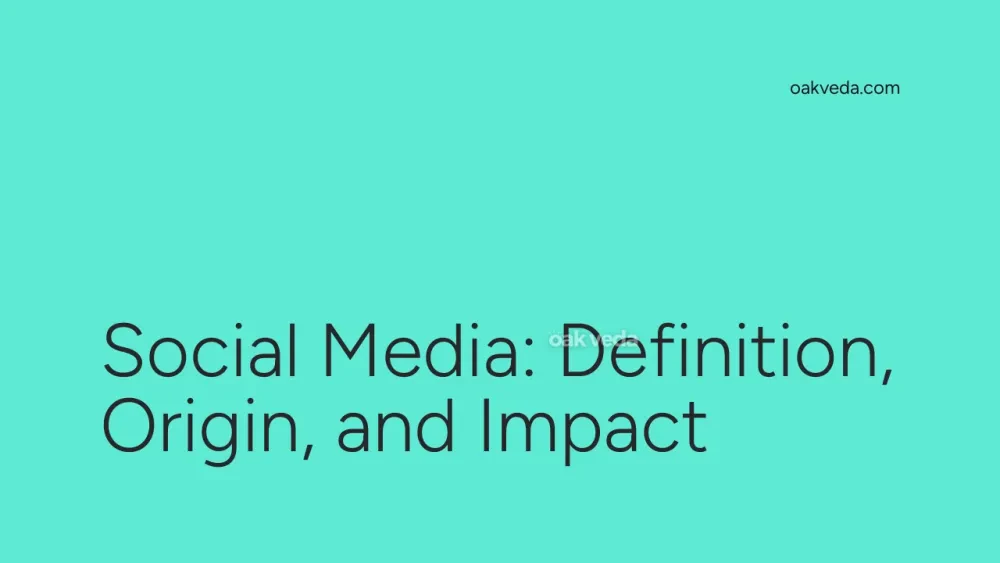
What is Social Media?
Social media refers to online platforms and applications that enable users to create, share, and interact with content, as well as connect with other users. These digital spaces facilitate the formation of virtual communities and networks, allowing individuals and organizations to communicate, collaborate, and engage in real-time across geographical boundaries.
Origin and Development of Social Media
The concept of social media has its roots in the early days of the internet. However, the modern era of social media began in the early 2000s:
- 2002: Friendster launches, pioneering the concept of online social networking
- 2003: MySpace debuts, becoming the most popular social platform for several years
- 2004: Facebook is founded, initially for college students before expanding globally
- 2006: Twitter introduces microblogging to the social media landscape
- 2010: Instagram launches, focusing on photo and video sharing
- 2011: Snapchat emerges with its unique disappearing content feature
- 2016: TikTok enters the market, revolutionizing short-form video content
Each platform's introduction brought new features and ways of interacting, shaping the evolution of social media as we know it today.
How Social Media Works
Social media platforms operate on a few key principles:
- User Profiles: Users create personal or business accounts to establish their online presence.
- Content Creation and Sharing: Users can post text, images, videos, or other media types.
- Connections: Users can follow, friend, or connect with other accounts.
- Engagement: Interactions occur through likes, comments, shares, and direct messages.
- Algorithms: Platforms use complex algorithms to determine what content to show users based on their behavior and preferences.
- Advertising: Most platforms offer targeted advertising options for businesses and marketers.
Types of Social Media Platforms
Social media encompasses various types of platforms, each serving different purposes:
- Social Networking: Facebook, LinkedIn
- Microblogging: Twitter, Tumblr
- Photo and Video Sharing: Instagram, TikTok, YouTube
- Messaging: WhatsApp, Telegram
- Professional Networking: LinkedIn
- Content Curation: Pinterest, Reddit
- Review and Recommendation: Yelp, TripAdvisor
- Virtual and Augmented Reality: Snapchat filters, Facebook's Metaverse
Popular Examples of Social Media
While new platforms emerge regularly, some have maintained their popularity over the years:
- Facebook: With over 2.9 billion monthly active users, it remains the largest social network globally.
- YouTube: The second most visited website worldwide, it's the go-to platform for video content.
- Instagram: Known for its visual focus, it has over 1 billion monthly active users.
- TikTok: Rapidly growing, it has become a cultural phenomenon with its short-form videos.
- Twitter: A key platform for real-time news and public discourse.
- LinkedIn: The primary social network for professional networking and career development.
Impact of Social Media on Culture
Social media has profoundly influenced modern culture:
- Communication: It has transformed how people interact, making instant global communication possible.
- Information Sharing: News and information spread rapidly, sometimes leading to "viral" content.
- Digital Marketing: Businesses now have direct channels to engage with customers and promote products.
- Political Discourse: Social media has become a significant platform for political campaigns and activism.
- Personal Branding: Individuals can build and promote their personal brand to a wide audience.
- Mental Health: While connecting people, it has also raised concerns about addiction and self-esteem issues.
Controversies Surrounding Social Media
Despite its benefits, social media faces several ongoing controversies:
- Privacy Concerns: Data collection and usage practices have come under scrutiny.
- Misinformation: The spread of fake news and conspiracy theories is a persistent issue.
- Cyberbullying: Online harassment has become a significant problem, especially among younger users.
- Addiction: Excessive use of social media has been linked to mental health issues.
- Political Manipulation: Concerns about foreign interference in elections through social media platforms.
- Content Moderation: Platforms struggle with balancing free speech and controlling harmful content.
How Brands and Influencers Use Social Media
Businesses and influencers leverage social media for various purposes:
- Brand Awareness: Building and maintaining a strong online presence.
- Customer Engagement: Directly interacting with customers for support and feedback.
- Content Marketing: Sharing valuable content to attract and retain customers.
- Influencer Partnerships: Collaborating with influencers to reach target audiences.
- Social Selling: Using platforms to drive sales directly or indirectly.
- Community Building: Creating and nurturing online communities around brands or interests.
Future Trends in Social Media
The social media landscape continues to evolve. Some emerging trends include:
- Augmented Reality (AR) Integration: More platforms are incorporating AR features for enhanced user experiences.
- Ephemeral Content: Short-lived content like Stories is becoming increasingly popular across platforms.
- Social Commerce: In-app shopping features are being developed to streamline the purchasing process.
- AI and Chatbots: Artificial intelligence is being used to improve user experience and automate customer service.
- Privacy-Focused Platforms: In response to data concerns, more privacy-centric social networks are emerging.
- Niche Communities: Platforms catering to specific interests or demographics are gaining traction.
FAQs about Social Media
-
Is social media safe for children? While many platforms have age restrictions, parental guidance and education about online safety are crucial for younger users.
-
How can businesses measure social media ROI? Businesses can track metrics like engagement rates, conversions, and brand sentiment to measure return on investment.
-
Can social media addiction be treated? Yes, there are various strategies and therapies available to help manage social media addiction.
-
How do social media algorithms work? Algorithms analyze user behavior, preferences, and interactions to determine what content to show in feeds.
-
What's the future of social media? The future likely involves more immersive experiences, increased personalization, and a greater focus on privacy and data protection.
In conclusion, social media has become an integral part of modern life, revolutionizing communication, business, and culture. As it continues to evolve, understanding its impact and staying informed about new developments is crucial for both personal and professional success in the digital age.
You may be interested in:

